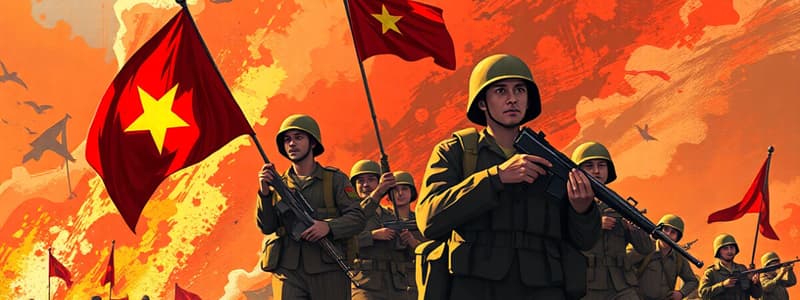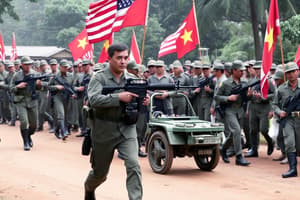Podcast
Questions and Answers
What was a major consequence of the Vietnam War regarding public perception?
What was a major consequence of the Vietnam War regarding public perception?
- It increased public support for military interventions.
- It created widespread public disillusionment. (correct)
- It led to an increase in defense spending.
- It had no significant impact on public perception.
What actions did antiwar protesters take during the Vietnam War?
What actions did antiwar protesters take during the Vietnam War?
- They advocated for increased military support.
- They participated in peaceful negotiations with the government.
- They organized support rallies for American troops.
- They occupied government buildings and burned draft cards. (correct)
How did media coverage of the Vietnam War affect public opinion?
How did media coverage of the Vietnam War affect public opinion?
- It led to a desensitization to war violence among viewers.
- It convinced the majority to support the war effort.
- It provided unprecedented access to the war's brutality, influencing antiwar sentiment. (correct)
- It was primarily focused on political discussions rather than battlefield coverage.
What does the term 'living room war' refer to in the context of the Vietnam War?
What does the term 'living room war' refer to in the context of the Vietnam War?
Which factor contributed significantly to the rise of the antiwar movement during the Vietnam War?
Which factor contributed significantly to the rise of the antiwar movement during the Vietnam War?
What was President Johnson's reaction to the CBS News segment about the Marines burning the village of Cam Ne?
What was President Johnson's reaction to the CBS News segment about the Marines burning the village of Cam Ne?
What does the term 'credibility gap' refer to in the context of the Vietnam War?
What does the term 'credibility gap' refer to in the context of the Vietnam War?
What was the common nickname given to afternoon press briefings in Saigon by American journalists?
What was the common nickname given to afternoon press briefings in Saigon by American journalists?
What misleading information did the U.S. government provide during press briefings about the war?
What misleading information did the U.S. government provide during press briefings about the war?
Which event exemplified the American government's efforts to maintain a positive image of the Vietnam War?
Which event exemplified the American government's efforts to maintain a positive image of the Vietnam War?
What was a significant outcome of the Tet Offensive in January 1968?
What was a significant outcome of the Tet Offensive in January 1968?
Which event during the Tet Offensive was particularly impactful in shaping public perception of the war?
Which event during the Tet Offensive was particularly impactful in shaping public perception of the war?
How did U.S. forces respond to the Tet Offensive?
How did U.S. forces respond to the Tet Offensive?
What did the Tet Offensive reveal about the Vietcong's capabilities?
What did the Tet Offensive reveal about the Vietcong's capabilities?
What belief was particularly challenged following the Tet Offensive?
What belief was particularly challenged following the Tet Offensive?
What political strategy did Richard Nixon employ during his campaign to address the fears of the American public?
What political strategy did Richard Nixon employ during his campaign to address the fears of the American public?
Which term did Nixon use to describe his base of supporters who wanted a resolution to the Vietnam War?
Which term did Nixon use to describe his base of supporters who wanted a resolution to the Vietnam War?
What impact did the violent clashes at the Democratic Party's national convention in Chicago have on public perception?
What impact did the violent clashes at the Democratic Party's national convention in Chicago have on public perception?
How did local police actions during protests affect the public's view of the social climate?
How did local police actions during protests affect the public's view of the social climate?
What underlying theme was present in President Johnson's decision not to seek reelection?
What underlying theme was present in President Johnson's decision not to seek reelection?
What was Nixon's strategy for achieving his goal of 'peace with honor' during the Vietnam War?
What was Nixon's strategy for achieving his goal of 'peace with honor' during the Vietnam War?
Which tactic did Nixon employ to psychologically influence North Vietnam's leadership?
Which tactic did Nixon employ to psychologically influence North Vietnam's leadership?
What was a significant result of Nixon’s secret bombing campaign during the Vietnam War?
What was a significant result of Nixon’s secret bombing campaign during the Vietnam War?
What tragic event occurred at Kent State University during the Vietnam War protests?
What tragic event occurred at Kent State University during the Vietnam War protests?
What aspect of Nixon's Vietnamization plan specifically aimed at changing the dynamics of the war effort?
What aspect of Nixon's Vietnamization plan specifically aimed at changing the dynamics of the war effort?
Flashcards are hidden until you start studying
Study Notes
Public Disillusionment and Escalation
- The Vietnam War caused significant disillusionment among the American public as involvement escalated under the Johnson administration.
- The primary aim of the escalation was to prevent a communist takeover in Vietnam.
Antiwar Movement
- Public concerns grew due to stalemates, high body counts, vague war objectives, and the military draft.
- A robust antiwar movement emerged, leading to widespread protests across the United States and Europe.
Forms of Protest
- Protesters took various actions including burning draft cards, refusing to pay income taxes, occupying government buildings, and disrupting trains carrying war materials.
- Notable incident: Hundreds of protesters were arrested while surrounding the Pentagon.
Role of Media
- Antiwar protests intensified, significantly driven by graphic televised coverage of the war's violence and brutality.
- Vietnam War was referred to as the first "living room war," highlighting the direct access of the public to war imagery and narratives through TV and print media.
- The unprecedented media coverage played a crucial role in shaping public perception and fueling dissent against the war.
Media Representation of the Vietnam War
- CBS Evening News aired a shocking segment in 1965 showing U.S. Marines burning the village of Cam Ne.
- The incident highlighted military disregard for civilian lives, accusing villagers of supporting Vietcong.
- President Johnson reacted furiously, accusing CBS of disrespecting American values.
Credibility Gap
- A significant disparity existed between government reports and the realities of the Vietnam War, termed the "Credibility Gap."
- Government press briefings often presented an overly positive outlook, citing enemy casualties and successful operations.
- Journalists on the ground in Vietnam grew skeptical of these assertions, dubbing afternoon briefings in Saigon the "Five o'Clock Follies" due to their deceptive nature.
Tet Offensive Overview
- January 1968 marked a significant escalation in the Vietnam War with the Tet Offensive launched by communist forces.
- The offensive targeted over one hundred sites, including the American embassy in Saigon, demonstrating strategic coordination by the Vietcong.
US Response and Impact
- US Forces successfully repelled the attacks and inflicted heavy casualties on Vietcong fighters, showcasing military capability.
- Despite military successes, the offensive showcased the Vietcong's continued capacity for large-scale strikes, undermining perceptions of progress in the war.
Trust Erosion and Public Sentiment
- The Tet Offensive significantly eroded public trust in government claims regarding the war's progress.
- Televised coverage of the violence, particularly during the Battle of Huế, played a crucial role in intensifying the anti-war movement within the United States.
President Johnson and Reelection
- President Johnson decided against seeking reelection, contributing to a sense of instability in the country.
- This decision came amidst widespread unrest and discontent in American society.
Chicago Democratic Convention
- The Democratic Party's national convention in Chicago was marked by violent clashes between police and protesters.
- Local police used brutal tactics against demonstrators, captured on national television, further shocking the public.
Richard Nixon's Campaign
- Richard Nixon, running for president, leveraged the public's fear of societal chaos.
- He positioned himself as the "law and order" candidate, appealing to voters seeking stability and peace.
Silent Majority
- Nixon coined the term "silent majority" to describe Americans who supported U.S. troops and desired an honorable resolution to the Vietnam War.
- This demographic felt overlooked amid the ongoing protests and riots, resonating with Nixon's campaign message.
Vietnamization and Withdrawal
- Nixon's strategy aimed to transfer the responsibility of the Vietnam War to South Vietnamese forces while achieving "peace with honor."
- Plans included phasing out the military draft and gradually withdrawing American troops from Vietnam.
- Emphasis on training South Vietnamese military to take over more duties in the conflict.
Secret Bombing Campaign
- Nixon implemented a covert bombing strategy targeting North Vietnamese supply lines, particularly across Laos and Cambodia.
- The bombing campaign aimed to pressure North Vietnam into peace negotiations but ultimately failed to initiate talks.
- Renewed public sentiment against the war, leading to increased antiwar demonstrations in the U.S.
National Response and Violence
- Antiwar protests escalated in response to the continuing conflict and Nixon’s military strategies.
- Significant incidents included the killing of six students during protests at Jackson State University and Kent State University in 1970 by police and National Guard troops.
- These events heightened national attention on the antiwar movement and sparked further outrage against governmental actions.
Studying That Suits You
Use AI to generate personalized quizzes and flashcards to suit your learning preferences.




